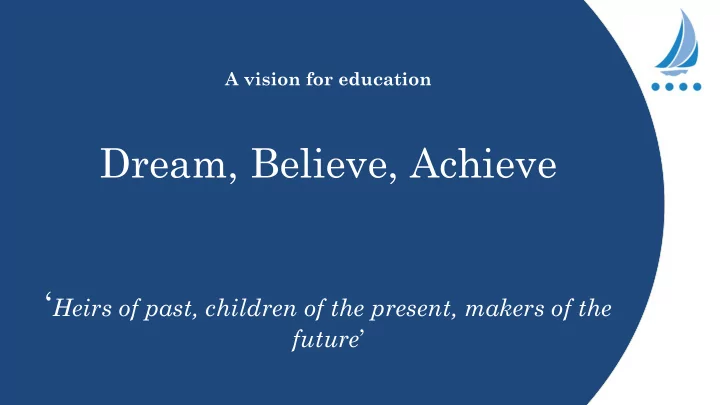

A vision for education Dream, Believe, Achieve ‘ Heirs of past, children of the present, makers of the future ’
TWO HOUSEHOLDS… Shakespeare vs Ken Robinson Socrates vs Athens
‘Two households…’ To do… #SwiftShowcase ‘the purpose of education’
‘Two households…’ • EVERYBODY has a view about education (Parents, teachers, politicians, students, society, the workforce) • The debate about the purpose of education is NOT a new one and has been around for centuries There are two main camps of thought; the traditional and the progressive • Debates about approach (traditional or progressive; research based, level chasing, data driven…) are meaningless until there is an agreed sense of purpose.
It’s all Greek to me… Its could be argued that education can fall into one of two categories: Traditional: The purpose of education is for the Good of the State: The greater good – teaching traditional values, social norms, etiquette. Passing on the knowledge and lessons learnt in through time Progressive: The purpose of education is for the good of individuals; reinventing current thinking; challenging the norm in a search for new and more effective ways of doing things.
The Marriage of both houses How do you bridge this gap? Do we want to be; Traditionally progressive or Progressively traditional
Children of the 21 st Century and Children of the 16 th Century “It is imperative that today’s educators provide a learning environment that takes students beyond the walls of their classrooms and into a world of endless opportunities .” The International Society for Technology in Education :
A Curriculum for tomorrow based on lessons from the past • The Trivium Grammar, Dialectic and Rhetoric (language and ways of doing things) • The Quadrivium: Arithmetic, geometry, music and astronomy (number and content)
The Trivium Grammar Dialectic Rhetoric
The Trivium Grammarian Dialectic Rhetoric
‘ Two households…’ Grammarian Dialectic Traditional Progressive
‘ From a ncient grudge…’ Grammarian Dialectic Tradition Progressive Benefits the STATE Benefits INDIVIDUALS (Decision line) – Place your post it note…
‘breaks new mutiny.’ Ark vision… ‘Our aim is to create outstanding schools that give every Ark pupil the opportunity to go to university or pursue the career of their choice .’ UNIVERSITY and Education: A very modern dilema
The privileged few Number of people who attend university … 1920 1930 1940 1950 1960 1970 1980 1990 2000 2010 4357 17,337 243,246 350,800
Developing Character THE AGE OF ENLIGHTENMENT WAS DESIGNED TO SORT LEADERS FROM WORKERS . IF THE PERCENTAGE OF GRADUATES CONTINUES TO INCREASE THEN WHAT IS THE TRUE AIM OF EDUCATION?
Broken… I believe the 20 th C. model of schooling is broken. This belief is based on three key assertions: - Assertion 1: The State no longer has ownership of knowledge - Assertion 2: University is no longer the aspirations for the privileged few - Assertion 3: Globalisation has reshaped traditional culture and opened the doors to more diverse communities
Dr. Google Assertion 1: THE STATE NO LONGER HAS OWNERSHIP OF KNOWLEDGE. The digital information age The 20 th C model of education appoints teacher as knowledge holder and the state dictates ‘the best of what has been said and the best of what has been done.’ Knowledge was controlled to help protect tradition and the status quo In 48 hours Google generates more information than has been recorded from the Ancient Greeks to 2003. Anyone can access anything they would like to find out about. It could be argued that it’s far more useful to be able to connect ideas and information than to be able to retain and memorise them. The learned few? Who to listen to? KNOWLEDGE = POWER or STAGE + VOICE + LISTENERS = POWER The State doesn’t control knowledge; nor can it control the platform on which it is shared
Graduate of what? Assertion 2: UNIVERSITY IS NO LONGER THE ASPIRATION FOR THE PRIVILEGED FEW Workplace Readiness In its original set-up the aim of State education was to identify those individuals capable of positions. The learned few that would lead the masses. As main stream schooling has improved the percentage of individuals now gaining a degree has also improved. Making the degree itself worth less and less; as the search for work becomes ever more competitive. If the degree is no longer the currency of the 21 st Century, then what has taken its place. If employers are facing a panel with equally impressive CVs what will make some people stand out amongst the rest?
Come fly with me… Assertion 3: GLOBALISATION HAS RESHAPED TRADITIONAL CULTURE AND OPENED THE DOORS TO MORE DIVERSE LOCAL COMMUNITIES Redrawing the World Boundaries through access The experience and influence of individuals at a local and national level is ever increasing. Better lines of communication and travel have opened up the door to a wider range of different opportunities and created virtual networks which are not restricted by border and/or boundary.
AND THIS IS RELEVANT BECAUSE…
There has never been a more exciting time in education…
Technology unleashes the door to the 21 st Century Grammarian Trivium; Bridging the gap between the; TRADITIONAL The best of that which has come before. Dialectic Rhetoric PROGRESSIVE Creativity, innovation and a chance to take risks RETERIC Communicate, inspire and deliver
Challenge Curriculum 21 st Century Core subject knowledge skills Life, career Core and character Knowledge development Academic Authentic Mastery Digital Citizenship Depth Creativity and before Innovation Breadth
Recommend
More recommend